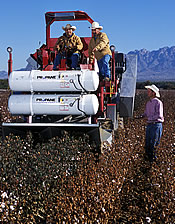This page has been archived and is being provided for reference purposes only. The page is no longer being updated, and therefore, links on the page may be invalid.
Farming on Propane
By Don ComisNovember 23, 2005
The sight of propane gas tanks on farms may become even more common in the years ahead, thanks to the recent signing of a memorandum of understanding (MOU) between the Agricultural Research Service (ARS) and the Propane Education and Research Council (PERC).
More than half of U.S. farms currently use propane for a variety of purposes including heating, fuel for tractors, crop drying and nonchemical pest control.
Winter heating is the most common use, but researchers and the council are interested in exploring ways to increase the use of propane in fall, spring and summer farming operations. Spreading out the use of propane year-round could lower its costs for winter heating.
With funding from PERC through an earlier agreement, ARS agricultural engineers Ed Hughs and Paul Funk at the ARS Southwestern Cotton Ginning Research Laboratory in Mesilla Park, N.M., have already developed a propane-fueled thermal plant defoliator, working in collaboration with New Mexico State University scientists. The prototype forces hot air through cotton and chili plants, which dries up the leaves overnight. This eliminates aphids and whiteflies, allows for an earlier harvest, and serves as a nonchemical alternative to both defoliants and insecticides.
The new MOU cites organic farming as one potential area for joint ARS and PERC research. There is immediate interest in exploring whether propane could be used for steam-based heat treatment as an effective alternative to methyl bromide fumigation to control insect pests in stored fruits, vegetables, grain and cotton.
Other potential areas for joint research cited in the MOU include fueling electricity generators and irrigation pumps, and incinerating farm wastes. Propane fuel causes less air pollution than gasoline or diesel.
This propane research fits into ARS’ overall goal of increasing options available to farmers to achieve sustainable agricultural productivity.
ARS is the U.S. Department of Agriculture’s chief scientific research agency.

